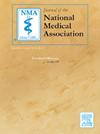心力衰竭与全身炎症反应指数之间的关系:横断面研究
IF 2.5
4区 医学
Q1 MEDICINE, GENERAL & INTERNAL
引用次数: 0
摘要
背景:全身炎症反应指数(SIRI)是最近开发的一种评估体内炎症整体程度的综合指数,与心力衰竭(HF)密切相关。本研究旨在评估 SIRI 与 HF 之间的潜在关联:这项横断面研究利用了美国国家健康与营养调查(NHANES)数据库中 2001 年至 2018 年的数据。SIRI根据单核细胞、中性粒细胞和淋巴细胞的计数计算得出。加权多变量线性回归模型检验了 SIRI 与高频之间的相关性。使用约束立方样条探索了两者之间的非线性关系,并通过亚组分析和交互检验验证了结果的稳健性:我们的研究纳入了 30294 名参与者,其中 814 人被诊断为高血压,29480 人被诊断为非高血压。多元线性回归分析表明,SIRI 与 HF 呈正相关(OR = 1.66;95 % CI,1.21, 2.29),两者之间不存在非线性关系。这种关系在亚组分析中依然存在:研究结果表明,SIRI 和 HF 之间存在线性正相关。结论:研究结果表明,SIRI与HF之间存在线性正相关关系,需要进一步开展广泛的前瞻性研究来验证这些发现。本文章由计算机程序翻译,如有差异,请以英文原文为准。
The association between heart failure and systemic inflammatory response index: A cross‐sectional study
Background
The systemic inflammatory response index (SIRI) is a recently developed composite index that assesses the entire extent of inflammation in the body, closely linked to heart failure (HF). This study aimed to evaluate the potential association between SIRI and HF.
Methods
The cross-sectional study utilized data from the National Health and Nutrition Examination Survey (NHANES) database from 2001 to 2018. SIRI is calculated based on the counts of monocytes, neutrophils, and lymphocytes. A weighted multiple-variable linear regression model examined the correlation between SIRI and HF. Using restrained cubic splines explored the nonlinear relationship between the two, and the robustness of the results was verified by subgroup analysis and interaction tests.
Results
Our study included 30,294 participants, 814 of whom were diagnosed with HF and 29,480 with non-HF. The multiple linear regression analysis showed that SIRI was positively correlated with HF (OR = 1.66; 95 % CI, 1.21, 2.29) and that there was no nonlinear relationship between the two. This relationship persisted in subgroup analyses.
Conclusions
The results indicate a linear positive correlation between SIRI and HF. Further extensive prospective studies are needed to validate these findings.
求助全文
通过发布文献求助,成功后即可免费获取论文全文。
去求助
来源期刊
CiteScore
4.80
自引率
3.00%
发文量
139
审稿时长
98 days
期刊介绍:
Journal of the National Medical Association, the official journal of the National Medical Association, is a peer-reviewed publication whose purpose is to address medical care disparities of persons of African descent.
The Journal of the National Medical Association is focused on specialized clinical research activities related to the health problems of African Americans and other minority groups. Special emphasis is placed on the application of medical science to improve the healthcare of underserved populations both in the United States and abroad. The Journal has the following objectives: (1) to expand the base of original peer-reviewed literature and the quality of that research on the topic of minority health; (2) to provide greater dissemination of this research; (3) to offer appropriate and timely recognition of the significant contributions of physicians who serve these populations; and (4) to promote engagement by member and non-member physicians in the overall goals and objectives of the National Medical Association.

 求助内容:
求助内容: 应助结果提醒方式:
应助结果提醒方式:


